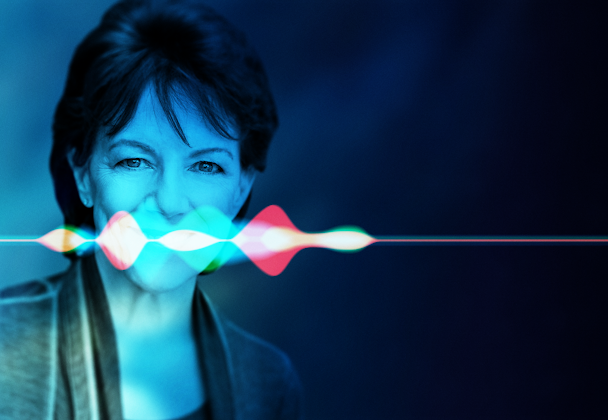The woman who gave Apple its voice
Since its first release, we’ve come to ask Siri everything. The Drum decided to talk to it a bit more, interviewing the human ‘original voice’, Susan Bennett.

Voice actress Susan Bennett was the original voice of Siri.
“Cow hoist in the tub today. Fasa ask fasa ask fuzzy.” In 2005, Susan Bennett, a voice-over actor and musician based in Atlanta, Georgia, recorded thousands of such phrases for four hours a day, five days a week, for what she thought was “a sort of phone messaging system”. Six years later this became the first voice of Siri.
Among several other voice actors, Bennett’s brief was to read thousands of phrases and sentences at the same pitch, the same pace and in the same tone for a Texan company. AI then helped extract sounds from these recordings and turn them into Siri ‘answers’.
“It was very, very, very tedious work, and I didn’t know how it was going to be used or that Apple wanted to create all of the possible sound combinations in the English language.”
Bennett’s voice was chosen as the first original Siri voice for English worldwide — a fact that came to light only when a colleague who recognized the voice called her up to inform her. “I could tell it was my voice but it had definitely been manipulated. It doesn’t really sound like my regular talking voice.”
In 2013 Bennett revealed in an interview with CNN that she was indeed the Siri voice. But why the two year delay, after the launch of Siri in 2011? “I was really upset about it, at first thinking that it would limit my career, and that really bothered me.
“Most people don’t really pay attention to recorded or automated voices because they are listening only for information. However, when you become this persona that people are talking to on their devices several times a day, that voice becomes recognizable and suddenly the voice actor becomes typecast.”
What was the Siri persona? Bennett says Apple tried to give Siri a personality, which was very edgy and not afraid to tell you what she thought. “I think my voice has an edge to it anyway, but that sass in the voice was provided by Apple. Also, the distinctive thing about Siri was that it was a voice of authority, with its low-pitched voice.”
When Apple launched iOS 11, Bennett’s voice was replaced by several other voice actors, which means that your Siri can now be either male or female. Bennett, however, claims she is ambivalent about the fact that her voice has since been dropped in favor of others.
“She speaks in a much higher pitch, sounds much younger and very off-hand. She speaks like all the others [virtual assistants], which I think is disappointing because the Siri voice was distinctive. But it’s now of the past.”
Bennett, meanwhile, has a new career as a public speaker, out of the recording studios and on to the stage. For someone who has also been the voice of GPS devices and addressed travelers in Delta airport terminals, she promises that the ‘original’ Siri voice will endure in this digital age.
